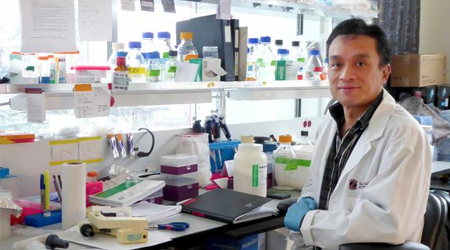MSFHR-funded researcher discovers a new drug that could stop prostate cancer in its tracks
6 June 2018

Prostate cancer is the most common cancer among Canadian men – 1 in 7 will be diagnosed with the disease in their lifetime, and 1 in 29 will die from it.*
2007 Scholar & 2017 I2C award recipient Dr. Christopher Ong and fellow researchers at the Vancouver Prostate Centre are in the early stages of development of a new drug that could have wide-reaching impacts on the future of the treatment of prostate cancer.
The drug, called PB1SD:FC, was developed after Ong and his colleagues discovered that a gene involved in the early stages of human development is activated in prostate cancer growth and treatment resistance. The gene, SEMA3C, tells cells to grow, but should go dormant after an embryo is fully formed. Although it’s still unclear what switches SEMA3C back on, it’s a major driving force behind most advanced cases of prostate cancer that Ong and his team have studied so far.
PB1SD:FC has shown promising early results in delaying the development of treatment-resistant forms of prostate cancer by blocking the SEMA3C gene from activating unhealthy cell growth.
Ong, who co-authored the publication of his team’s discoveries in EMBO Molecular Medicine, has been on SEMA3C’s trail since he received an MSFHR Scholar award in 2007.
“Back then, I was studying a gene called PTEN,” says Ong. “PTEN is like the ‘brakes’ of the cell, and when you lose the brakes, you get this runaway train kind of uncontrolled cancer growth.” PTEN is mutated in 50% of advanced prostate cancer cases, so part of this research was looking for genes that were able to tell which cells had lost these ‘brakes’. “That’s how we found SEMA3C,” says Ong, “and that’s what led us to this new area of research.”
Ong, who was one of MSFHR’s first Innovation to Commercialization cohort, says his 2017 I2C award came at an opportune time in the development of their new drug.
“It’s been instrumental and helped a lot in our work, and it’s still ongoing” he says. They had developed the PB1SD:FC drug but needed to make enough of the protein to test on a larger scale. The I2C award allowed them to do this and fed directly into the EMBO Molecular Medicine paper.
“What we’ve found so far with our drug is that it’s caused many of the tumours to become scar tissue,” says Ong; “it looks very promising.” Ong says the next steps include looking into combining their drug with other medications or chemotherapy, and preparing to apply for clinical trials.
Dr. Ong was one of 11 recipients of MSFHR’s inaugural Innovation to Commercialization awards.





